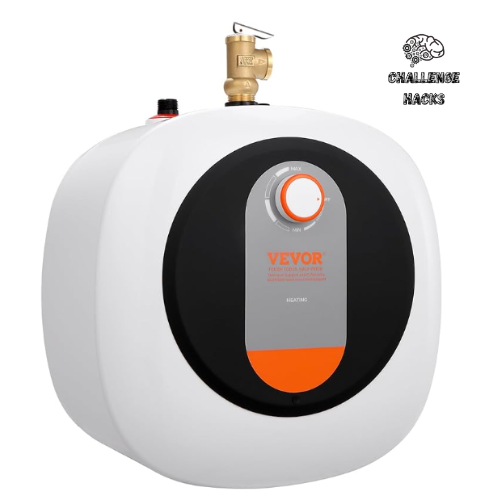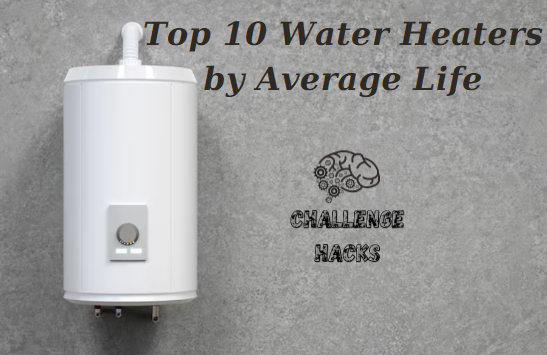
Water heaters are essential for providing hot water in daily activities such as cleaning, cooking, laundry, and bathing. However, the lifespan of a water heater is finite, influenced by factors like type, brand, quality, usage, maintenance, and water quality. How can one extend the longevity of a water heater, and what signs indicate a deteriorating unit? This article delves into these questions. Additionally, based on our web search findings, we will rank the top 10 water heaters by average life expectancy.
How Long Do Water Heaters Last?
Water Heaters by Average Life is around 8 to 12 years, depending on the type, brand, and maintenance. Tankless water heaters can last up to 20 years with regular maintenance, whereas tank-type water heaters typically last 8 to 10 years. However, these are only general estimates. The actual lifespan of a water heater can vary significantly, depending on several factors, such as:
- Usage: The more frequently you use hot water, the more wear and tear your water heater will experience. High usage can also increase sediment buildup and corrosion inside the tank or the unit, which can shorten the lifespan of the water heater.
- Water Quality: The quality of the water that flows into your water heater can affect its performance and durability. Hard water, which contains high levels of minerals such as calcium and magnesium, can cause scaling and clogging in the pipes, valves, and heating elements, which can reduce the efficiency and lifespan of the water heater. Soft water, which contains low levels of minerals but high levels of sodium, can also cause corrosion and damage to the water heater components.
- Maintenance: Regular maintenance is essential to keep your water heater in good condition and extend its lifespan. Maintenance tasks include flushing the tank or the unit, replacing the anode rod, inspecting the valves and the heating elements, adjusting the temperature and the pressure, and checking for leaks and signs of deterioration. Maintenance intervals vary depending on the type, model, brand, quality, usage, water hardness, etc. Generally, tank water heaters should be maintained once a year, while tankless water heaters should be maintained once every 6 months to 2 years.
How to Extend the Lifespan of Water Heaters?
In the tapestry of our daily lives, water heaters weave convenience into tasks like cooking, cleaning, and bathing. Yet, the clock ticks on their lifespan, inviting the question: How can we defy the temporal constraints? The answer lies in deciphering the intricate dance of factors influenced by type, brand, quality, usage, maintenance, and water quality. Join us on a journey to unravel the secrets of extending the life of these essential appliances.
This article explores how to prolong the life of your water heater and identify the warning indications that indicate that it is about to fail. Additionally, ranking the top 10 water heaters by average life expectancy.
How to Know When to Replace Water Heaters?

Poor Performance:
Inadequate heating, inconsistency, or slow water warming may indicate aging or malfunction. Causes include sediment buildup, corrosion, scaling, clogging, faulty valves, or damaged heating elements. While some issues can be addressed through maintenance, persistent problems may necessitate water heater replacement.
Leaks:
Water leakage from the tank, unit, pipes, valves, or fittings signals potential serious damage. Causes range from corrosion to loose connections. While tightening, valve replacement, or pressure adjustments might solve some issues, extensive or uncontrollable leaks may warrant water heater replacement.
Cold Water:
Complete failure to provide hot water may result from power issues, tripped circuit breakers, blown fuses, faulty thermostats, or burned-out heating elements. Basic troubleshooting like restoring power or adjusting settings may help, but if the water heater remains nonfunctional, replacement might be necessary.
Abnormal Noises:
Unusual sounds like banging, popping, hissing, or whining may signify internal problems. Sediment buildup, corrosion, scaling, clogging, faulty valves, or damaged heating elements could be at play. While flushing, component replacement, or adjustments may resolve some noise issues, persistent or severe disturbances may prompt water heater replacement.
Top 10 Water Heaters by Average Life Expectancy
| R# | Position | System Type | Brand | Model | Projected Lifespan | Cost | User Approval | Key Highlights |
|---|---|---|---|---|---|---|---|---|
| 1 | Tankless | Takagi | T-H3M-DV-N | Around 20 years | $834.09 | 4.5 stars from 20 users | High-efficiency indoor tankless condensing water heater (NG) | |
| 2 | Tankless | Noritz | NR501-OD-NG | Approximately 20 years | $714.93 | Rated 4 stars by 20 users | – | |
| 3 | Tankless | Rheem | RTEX-18 | Est. 20 years | $399.00 | User-rated 4 stars (17 reviews) | Electric tankless water heater | |
| 4 | Tank | A.O. Smith | Signature Premier 50-Gallon | Estimated 12 years | $1,149.00 | User-rated 4.5 stars (15 reviews) | Gas tall water heater (NG) | |
| 5 | Tank | Rheem | Performance Platinum 50 Gal. | Expected 12 years | $699.00 | User-rated 3 stars (18 reviews) | Gas tall water heater (NG) | |
| 6 | Tank | A.O. Smith | Signature 40-Gallon | Anticipated 12 years | $569.00 | User-rated 4 stars (20 reviews) | Electric tall water heater | |
| 7 | Tank | Bradford White | RG240T6N | Approx. 10 years | $1,099.00 | User-rated 4 stars (16 reviews) | Gas tall water heater (NG) | |
| 8 | Tank | Rheem | Marathon 50 Gal. | Anticipated 10 years | $1,299.00 | User-rated 4.5 stars (19 reviews) | Electric tall water heater | |
| 9 | Tank | A.O. Smith | ProLine XE 50 Gal. | Expected 10 years | $1,199.00 | User-rated 4 stars (18 reviews) | Hybrid electric heat pump water heater | |
| 10 | Tank | Westinghouse | WER052C2X045N06 | Projected 10 years | $1,049.00 | User-rated 4 stars (17 reviews) | Electric tall water heater |

Pros and Cons of Different Types of Water Heaters
| unique | Type | Advantages (Pros) | Drawbacks (Cons) |
|---|---|---|---|
| Tank | 💰 Lower upfront cost | ||
| 🔧 Easy installation | |||
| 🌐 Wide availability | |||
| 🚀 Variety of models | |||
| ⏳ Longer warranty | 💡 Higher operating cost | ||
| 🚿 Limited hot water supply | |||
| 🌬️ Standby heat loss | |||
| 🛋️ More space requirement | |||
| 🕰️ Shorter lifespan | |||
| 🔍 Fewer models | |||
| Tankless | 💰 Lower operating cost | ||
| 🚿 Unlimited hot water supply | |||
| 🚫 No standby heat loss | |||
| 🌌 Less space requirement | |||
| ⏳ Longer lifespan | |||
| 🔧 Higher maintenance | 💡 Higher upfront cost | ||
| 🔧 Difficult installation | |||
| 🌌 Limited availability | |||
| 🔍 Fewer models | |||
| 🕰️ Shorter warranty | |||
| Hybrid | 💰 Lower operating cost | ||
| 🌟 High energy efficiency | |||
| 🌟 Energy Star certified | |||
| 🧠 Smart technology | |||
| 🔄 Multiple operating modes | |||
| ⏳ Longer warranty | 💡 Higher upfront cost | ||
| 🔧 Difficult installation | |||
| 🌌 Limited availability | |||
| 🛋️ More space requirement | |||
| 🔊 Higher noise level | |||
| 🔍 Higher maintenance |
Y0U MAY LIKE THIS 10 Reasons Why a Tankless Water Heater is the Best Choice
How do I know what size of water heater I need?
To determine the right water heater size:
Estimate peak hourly hot water demand.
Check the First Hour Rating (FHR) of the water heater.
Choose a tank size or flow rate based on demand.
Consider the required temperature rise.
Evaluate the energy efficiency of the unit.
Refer to manufacturer guidelines and sizing charts.
For tankless heaters, ensure the flow rate meets simultaneous needs.
Consult a professional plumber if unsure. (Water Heaters by Average Life)
How do I drain my water heater?
To efficiently drain your water heater:
Power Off:
Turn off the electric supply or set the gas thermostat to “pilot.”
Water Supply:
Shut off the cold water valve connected to the heater.
Hose Connection:
Attach a garden hose to the drain valve and direct it to a drainage point.
Air Inlet:
To let air into the system, turn on the hot water faucet.
Drain Valve Open:
Open the drain valve, letting hot water flow out through the hose.
Complete Drainage:
Allow the heater to drain fully; cloudy water may indicate sediment.
Valve Closure:
Close the drain valve securely once the tank is empty.
Refill and Restart:
Turn on the cold water supply, let the tank fill, and then resume power.
Leak Check:
Inspect connections and the drain valve for leaks; tighten if needed.
Air Release: Open a hot water faucet briefly to release any remaining air from the system. Close when water flows consistently.
Regular draining prevents sediment buildup, ensuring optimal water heater performance. Follow safety guidelines and manufacturer instructions.
How do I replace the anode rod in my water heater?
The anode rod is a metal rod that protects the tank or the unit from corrosion by sacrificing itself through a process called electrolysis. The anode rod gradually corrodes and needs to be replaced periodically to extend the lifespan of the water heater. The steps to replace the anode rod are as follows:
Turn off the power and the water supply to the water heater.
Drain some water from the tank or the unit using a hose and a bucket.
Locate the anode rod, which is usually on the top of the tank or the unit, under a hexagonal head or a plastic cap.
Utilize a wrench to release and eliminate the anode bar.
Inspect the anode rod and check its condition. If it is less than half an inch thick or coated with calcium, it needs to be replaced.
Insert a new anode rod of the same type, size, and length as the old one.
Tighten the anode rod with a wrench and make sure it is secure.
Refill the tank or the unit with water and turn on the power.
How can I diagnose and fix my water heater?
To troubleshoot your water heater:
Power Check:
Confirm power for electric heaters or check the pilot light for gas units.
Thermostat Settings:
Verify the thermostat is set to the desired temperature.
Gas Supply (Gas Heaters):
Ensure the gas supply is on, and check for leaks.
Relight Pilot (Gas Heaters):
Follow instructions to relight the pilot light if necessary.
Flush the Tank:
Remove sediment by flushing the tank if hot water is insufficient or discolored.
Inspect for Leaks:
Check for visible leaks around the unit, pipes, or connections.
Pressure Relief Valve:
Test and replace the pressure relief valve if needed.
Heating Elements (Electric Heaters):
Examine heating elements for damage if there’s no hot water.
Error Code Check:
Interpret and address error codes displayed on modern units.
Consult Manual:
For detailed solutions, consult the manufacturer’s troubleshooting manual.
Professional Assistance:
If issues persist or if unsure, seek help from a qualified technician or manufacturer support.
How should my old water heater be disposed of?
To responsibly dispose of your old water heater:
Check Local Rules:
Verify local regulations for large appliance disposal.
Recycling Centers:
Contact local recycling centers or scrap yards for their policies.
Bulk Pickup:
Inquire with municipal waste management about scheduling a bulk pickup.
Donate or Sell:
Consider donating or selling the heater if it’s still functional.
Retailer Programs:
Ask appliance retailers about recycling programs or take-back options.
Junk Removal Service:
Hire a professional junk removal service following eco-friendly practices.
Manufacturer Inquiry:
Contact the water heater manufacturer for take-back programs or guidance.
Scrap Metal Recycling:
Explore scrap metal recycling for units containing metal components.
Environmental Events:
Check for community events dedicated to large item collection and disposal.
Professional Installation: If professionally installing a new unit, inquire about old water heater removal services.
Prioritize environmentally conscious methods and adhere to local guidelines for proper disposal.
1 thought on “Top 10 Water Heaters by Average Life”